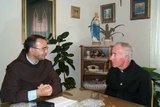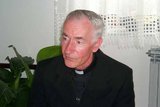| | ||||
Interview: Mgr. Hermann Reich, Bishop of Papua New Guinea Date: July 27, 2005 , Originally published October 2, 2001 Category: Interviews , Medjugorje in the Catholic Church Mgr. Hermann Reich, Bishop of Papua (New Guinea), came for a private visit to Medjugorje from September 21 to 26, 2001. In an interview with Fr. Branko Radoš, parish priest of Medjugorje, he spoke about his experiences and impressions. Fr. Branko Radoš: Monsignor, we wish you a hearty welcome to Medjugorje. Would you be so kind as to introduce yourself?Mgr. Hermann Reich: I am bishop Hermann Reich, born in Tyrol, Austria. Since 1964, I am a missionary in Papua – New Guinea. In 1980, I was appointed Vicar General of a diocese, which was a part of an archdiocese politically separated from us. This is why we became a special diocese. In 1982, I was ordained as the first bishop of this new diocese. Since then, I am the bishop of this diocese. Fr. Branko Radoš: Could you tell us something more about the Church in New Guinea?Mgr. Hermann Reich: In Papua New Guinea we have fifteen dioceses. Most of the bishops are still white, religious of different congregations, but we already have seven auxiliary bishops from Papua, and we can say that this Church is increasingly founded on local people. This is what the faithful demand and expect more and more. Papua New Guinea has about six million inhabitants, and only a million and a half are Catholics, which is about a quarter of the population. There are many Protestants, many sects. Adventists are very strong, as well as Anglicans. The Papuans are not pagans any more in the original sense of the word: most of them have joined a religious community. They are baptised. They have more or less accepted faith and belong to a religion. Fr. Branko Radoš: Do young men desire to become priests?Mgr Hermann Reich: It goes very slowly. We have a regional seminary with about twenty seminarians for 18 dioceses. This is not much indeed. Annually, we have about 15 to 16 priestly ordinations, which means not even one per diocese. It goes slowly. Different congregations work now on vocations, but it was not like that in the past. It was mostly Rome that took care of the vocations, but now each congregation does it on its own. We are fairly successful. Fr. Branko Radoš: What is the attitude of the faithful towards Mary, the Mother of God?Mgr. Hermann Reich: The Mother of God is very much known, loved and venerated. It can be seen not only on her feast days, but also on other occasions: her statue is carried in processions from parish to parish. Yes, she is very beloved and venerated. Medjugorje is not very much known. We do not have enough information. Some missionaries have discovered Medjugorje, then local priests, religious men and women… I really care for this. I talk about Medjugorje. People are very much interested, especially in the messages. The messages are very much read. I really care for this. They like to listen to me, but this does not happen in large circles. Fr. Branko Radoš: Which is the local language there?Mgr. Hermann Reich: The official language is English, but people speak ‘pidgin’ English, a mixture of English and German. Papua was for some time a German colony, and German songs and the German language are known there. We also have to know the local language, which in our diocese, is Inga. It is very difficult to learn. There are about 500 languages, counting all the dialects, there are about 800. We have to learn the common spoken language. Small groups who speak only local languages are disappearing. The spoken language is pidgin and this language is spoken by most of the inhabitants. Fr. Branko Radoš: When did you hear about Medjugorje for the first time?Mgr. Hermann Reich: If I remember well, it was very long ago. But I accorded it my attention for the first time in 1990. I was hospitalised in the clinic of the “Merciful Brothers” and I received some magazines published by “Gebetsaktion” in Vienna. It was then that I read them for the first time and paid the messages particular attention. Fr. Branko Radoš: You just spent some days in Medjugorje. Can you tell us something about your experience?Mgr. Hermann Reich: My impressions here in Medjugorje? First of all, the physical side of Medjugorje impressed me: rocks, rocks and again rocks. I was so impressed! I asked myself: My God, these people, what do they live on? The second impression was prayer. So many people in prayer, with the rosary in the hand… I was very impressed. Much prayer. This is what I have seen and, by this, I was impressed. These are my main impressions. The liturgy is very good. Concelebrations. The church always full, which is not the case in other churches in the West, especially in summer time. In Tyrol, very few people come to Holy Mass. What a pity. In Austria, wherever I have celebrated Holy Mass, people were glad, but they are small groups. And here, the church is full. Full of prayer. Fr. Branko Radoš: Could you say that this is the Church on a small scale: many people from many nations...Mgr. Hermann Reich: Yes, so many different languages, and you can understand almost everything. It is amazing that everybody has the feeling of belonging here, of not being a foreigner. Everybody can participate, even those who come from far. Fr. Branko Radoš: Many say that confession is one of the fruits of Medjugorje.Mgr. Hermann Reich: This is, of course, something special, something you cannot touch with your hands, but it is a big thing. In New Guinea, people go gladly to confession. Missionaries sit for hours in the confessional. Confession is very appreciated in New Guinea, but it could be appreciated even more… When you come to the West, you see that people see things in a different way. They all want common confessions. The personal confession is not accepted any more. Here, so many go for confession, and it is a big thing. Fr. Branko Radoš: Did you speak personally with pilgrims? What do they say?Mgr. Hermann Reich: I met some pilgrims and we spoke. They are touched and enthusiastic about what is happening here. The time was too short to have a deeper impression. Fr. Branko Radoš: Mary told us that She is the Queen of Peace. What do you think about this in this time of so many conflicts and wars?Mgr. Hermann Reich: It is a serious problem. I think that God, and Christ, and Our Lady offer us peace, but it depends on us if we will accept and realize this offer. It depends on us. If we do not want it, I think that the Mother of God and Heaven have to accept our free will, there is not much to be done, and it is really a pity, because there are so many destructions. But I believe that God can write straight on crooked lines. He will include this in His plans. Since the attacks in the US happened, I heard that people started again to pray more. They woke up. Peace is so important. I hope there will be peace. Fr. Branko Radoš: You have read the messages. What could you say about them?Mgr. Hermann Reich: I was struck by the main theme of our Lady’s messages, which is peace. Then, there is always again the question of conversion and confession. These are the main themes. I am also struck by the fact that she always comes back to the theme of prayer: do not be tired; pray, pray; decide yourselves for prayer; pray better. I think that there is much prayer, but maybe people do not pray in the right way. There is much prayer, there is quantity but, in many ways, there is a lack of quality. I think that we have, according to the desire of Our Lady, not to pray less but to improve the quality. We have to pray better. Fr. Branko Radoš: What would you say to us Franciscans, who work in this parish? What could we improve? How to better teach people to pray?Mgr. Hermann Reich: For the Franciscans this is not an unknown matter! I spent some days here, and I admire your service and your heroism in the work with these crowds. This logistics are a problem I would probably never be able to deal with! I admire you all for your implication and your action. I would say: keep on working in the same direction. There are always new pilgrims in Medjugorje and they want to experience this climate, this peace, this spirit of Medjugorje. If the Franciscans are able to give them that, many will take with them something good, which will continue to grow when they come home. It can be founding new prayer groups, but let the quality of prayer grow. It is not enough for people to pray much. Often, there is a danger to remain at the level of lips, and not to reach the prayer of the heart. The quality of prayer is really important: life has to become prayer. Fr. Branko Radoš: Fr. Slavko wrote several books on this: «Pray With the Heart», «Fast With the Heart»…Mgr. Hermann Reich: I read some of these books. Fr. Branko Radoš: Do you believe that the Mother of God is present here?Mgr. Hermann Reich: Yes, I am 100% sure about this. If she were not here, all this would not be possible; there would be no fruits. This is her work. I am convinced about it. When I am questioned about it, I say that – according to what I see and discern – the Mother of God is here. Fr. Branko Radoš: Would you like to say something to today’s Christians?Mgr. Hermann Reich: I would say: pray! Do not cease to pray. Even if you do not see the result you expect, keep on praying, make the effort to have a good prayer life. Take seriously the messages of Medjugorje and pray with them. This is the council I would give to every person I meet. Fr. Branko Radoš: Would you like to come to Medjugorje again?Mgr. Hermann Reich: If it is possible, of course, but probably not before two or three years. Missionaries in Papua New Guinea do not have holydays every year. When I come for holydays in two or three years, I will try to come again to Medjugorje. Fr. Branko Radoš: So, see you in two, three years? Mgr. Hermann Reich: See you! | | |||
|
| ||||
| | ||||



 )
) 
![[O]](/data/olm/images/__mt/nw.gif)